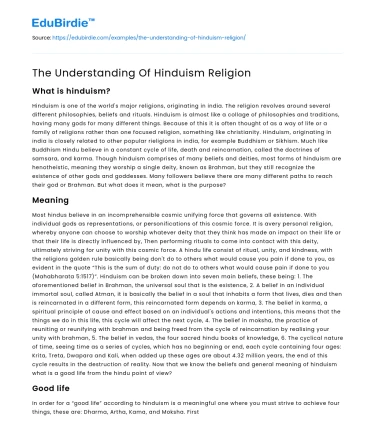What is hinduism?
Hinduism is one of the world's major religions, originating in india. The religion revolves around several different philosophies, beliefs and rituals. Hinduism is almost like a collage of philosophies and traditions, having many gods for many different things. Because of this it is often thought of as a way of life or a family of religions rather than one focused religion, something like christianity. Hinduism, originating in india is closely related to other popular rieligions in india, for example Buddhism or Sikhism. Much like Buddhism Hindu believe in a constant cycle of life, death and reincarnation, called the doctrines of samsara, and karma.
Though hinduism comprises of many beliefs and deities, most forms of hinduism are henotheistic, meaning they worship a single deity, known as Brahman, but they still recognize the existence of other gods and goddesses. Many followers believe there are many different paths to reach their god or Brahman. But what does it mean, what is the purpose?
Save your time!
We can take care of your essay
- Proper editing and formatting
- Free revision, title page, and bibliography
- Flexible prices and money-back guarantee
Meaning
Most hindus believe in an incomprehensible cosmic unifying force that governs all existence. With individual gods as representations, or personifications of this cosmic force. It is avery personal religion, whereby anyone can choose to worship whatever deity that they think has made an impact on their life or that their life is directly influenced by, Then performing rituals to come into contact with this deity, ultimately striving for unity with this cosmic force. A hindu life consist of ritual, unity, and kindness, with the religions golden rule basically being don't do to others what would cause you pain if done to you, as evident in the quote “This is the sum of duty: do not do to others what would cause pain if done to you (Mahabharata 5:1517)”. Hinduism can be broken down into seven main beliefs, these being: 1. The aforementioned belief in Brahman, the universal soul that is the existence, 2. A belief in an individual immortal soul, called Atman, it is basically the belief in a soul that inhabits a form that lives, dies and then is reincarnated in a different form, this reincarnated form depends on karma, 3. The belief in karma, a spiritual principle of cause and effect based on an individual's actions and intentions, this means that the things we do in this life, this cycle will affect the next cycle, 4. The belief in moksha, the practice of reuniting or reunifying with brahman and being freed from the cycle of reincarnation by realising your unity with brahman, 5. The belief in vedas, the four sacred hindu books of knowledge, 6. The cyclical nature of time, seeing time as a series of cycles, which has no beginning or end, each cycle containing four ages: Krita, Treta, Dwapara and Kali, when added up these ages are about 4.32 million years, the end of this cycle results in the destruction of reality. Now that we know the beliefs and general meaning of hinduism what is a good life from the hindu point of view?
Good life
In order for a “good life” according to hinduism is a meaningful one where you must strive to achieve four things, these are: Dharma, Artha, Kama, and Moksha. First dharma, in order to achieve dharma you must act morally, ethically and righteously throughout life, though you must also owe a debt to both the gods and other humans, you must repay this debt to all other forms of life through ritual and other means in order to achieve dharma. The next is Artha, refers to the moral and ethical pursuit of wealth and prosperity in life. The third is kama, which is basically finding pleasure and enjoyment in life by any means as long as they are ethical and morally just and also abide by the other rules of hinduism. The last is the previously mentioned moksha referring to enlightenment, unity with brahman, and ultimately breaking the cycle of reincarnation. This combined with the golden rule creates a good guideline for a good life in the hindu point of view.
Conclusion
In conclusion, living a good life in hinduism may seem complicated at first but can be broken down into four practices and the golden rule. Also the hindu religion as a whole has hopefully become less confusing or mysterious.






 Stuck on your essay?
Stuck on your essay?

